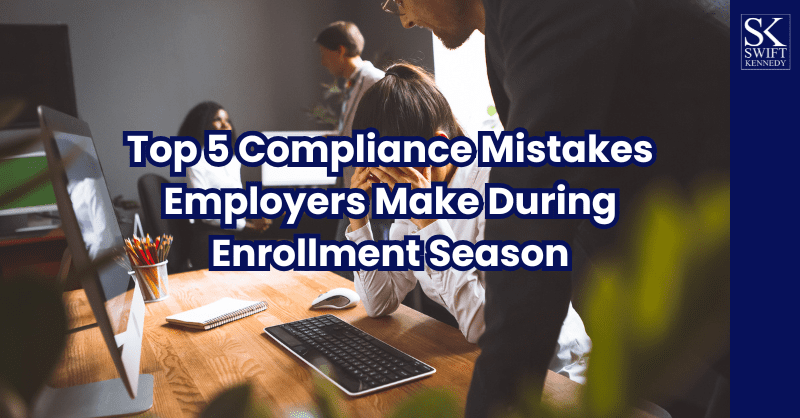
Top 5 Compliance Mistakes Employers Make During Enrollment Season
Open enrollment is one of the busiest and most important times of the year for HR teams. It’s when employees make decisions that directly impact their health, finances, and overall well-being. But while employers focus on packets, platforms, and questions, it’s easy to overlook compliance obligations that carry real penalties if missed.
At Swift Kennedy, we’ve seen how simple oversights during enrollment can create costly headaches later. Here are the five most common compliance mistakes employers make.
1. Missing Required Notices
Several annual notices are federally mandated during enrollment:
-
Medicare Part D Creditable Coverage Notice — must be sent to Medicare-eligible employees before October 15 each year. Employers must also disclose coverage status to CMS within 60 days of the plan year start.
-
CHIPRA Employer Premium Assistance Notice — employers in states with Medicaid/CHIP premium assistance must notify all employees annually.
-
HIPAA Special Enrollment Rights Notice — must be provided when employees are first offered enrollment.
-
Women’s Health and Cancer Rights Act (WHCRA) — notice of mastectomy-related reconstruction rights must be given at enrollment and annually thereafter.
2. Failing to Document Employee Elections
Verbal confirmations or incomplete forms don’t satisfy ERISA. Employers must maintain records that prove benefit eligibility and election/waiver decisions. These records must be kept at least six years and be sufficient to determine benefits due.
3. Overlooking ACA “Affordability” Rules
Applicable Large Employers (ALEs) — those with 50 or more full-time employees, including equivalents — must offer health coverage that:
-
Meets minimum value (≥60%), and
-
Is affordable under one of the IRS safe harbors (W-2 wages, Rate of Pay, or Federal Poverty Line).
Failure to meet these standards can trigger 4980H penalties.
4. Not Communicating COBRA Rights Clearly
Employees who lose coverage due to a qualifying event must receive COBRA election notices promptly:
-
Employer to administrator: within 30 days.
-
Administrator to qualified beneficiaries: within 14 days.
-
If the employer is also the administrator, you have 44 days total to send notices.
Employees then have at least 60 days to elect coverage.
5. Ignoring State-Specific Requirements
While federal notices get the most attention, states often impose their own rules on continuation coverage, paid leave, or premium assistance. Failing to include these can put multi-state employers out of compliance.
Final Thoughts
Compliance isn’t the most glamorous part of open enrollment, but it’s one of the most important. A missed notice or misstep today can lead to penalties, frustrated employees, and unnecessary costs tomorrow.
Be sure to check back next week when we’ll share practical strategies to avoid these mistakes and keep your enrollment process compliant from start to finish.
At Swift Kennedy, we specialize in helping employers navigate compliance with confidence. Contact us today to make sure your next open enrollment season is not only smooth, but also fully compliant.
Categories: Blog
Tags: ACA employer mandate, benefits compliance checklist, CHIPRA premium assistance, COBRA compliance, employee benefits compliance, ERISA recordkeeping, HIPAA enrollment notice, HR compliance mistakes, Medicare Part D notice, open enrollment compliance, section 4980H penalties, WHCRA notice
